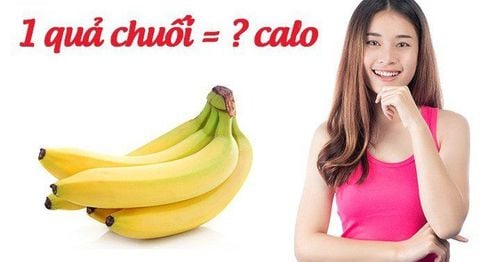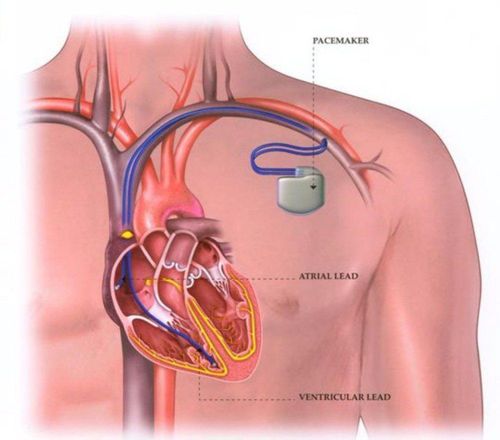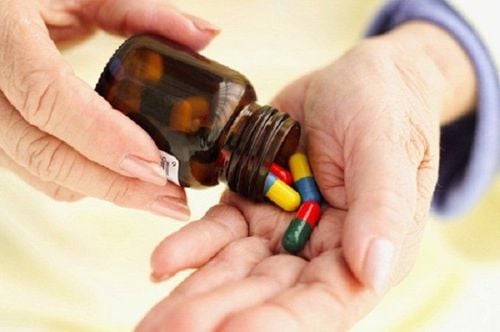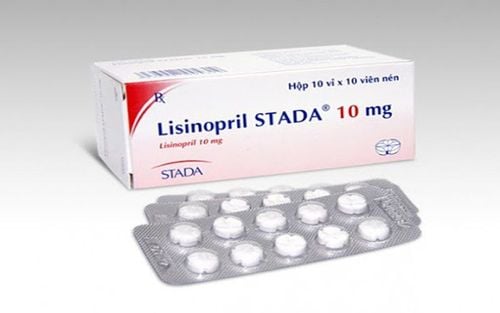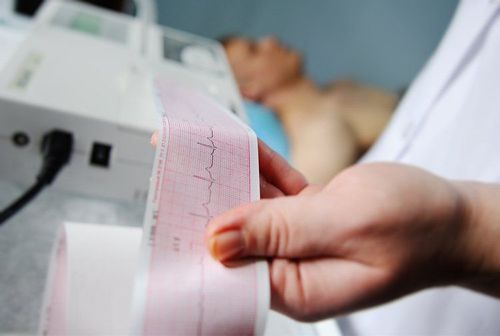This is an automatically translated article.
Atrial fibrillation is associated with arrhythmia conditions, so for those with the disease, it is very important to pay attention to the foods used in the diet. High-salt foods can cause high blood pressure and have a negative impact on atrial fibrillation... This article will present some foods that should or should not be used for this disease.
1. Atrial fibrillation
Atrial fibrillation, a fast or irregular heartbeat or arrhythmia that can lead to blood clots, stroke, heart failure, and other heart-related complications. At least 2.7 million Americans are living with atrial fibrillation.
During atrial fibrillation, the upper chambers of the heart (atria) beat chaotically and irregularly - out of sync with the lower chambers (ventricles) of the heart. For many people, atrial fibrillation may have no symptoms. However, Atrial fibrillation can cause a fast, pounding heartbeat (palpitations), shortness of breath, or weakness.
Atrial fibrillation episodes may come and go, or they may be persistent. Although atrial fibrillation itself is not usually life-threatening, it is considered a serious medical condition that requires appropriate treatment to prevent a stroke.
Treatment for atrial fibrillation may include medication, cardiac re-establishment therapy, and catheterization to block the faulty heart signal.
A person with atrial fibrillation may also have a heart rhythm-related problem - atrial flutter. Although atrial flutter causes different arrhythmias, the treatment is quite similar to that of atrial fibrillation.
2. Good foods for patients with atrial fibrillation
2.1. Fast food When having atrial fibrillation, irregular heartbeat, you need to pay attention to what people with atrial fibrillation should eat? Too much salt can raise your blood pressure, and high blood pressure can make you more susceptible to atrial fibrillation. High blood pressure can also make your symptoms harder to control. As a result, your chances of having a stroke increase.
One serving of cold sliced turkey can contain more than 1,000 milligrams of sodium. With this salt content can be enough for the needs of the whole day. Other very salty foods include pizza, canned soups, sandwiches, and rolls. Most fast food or canned foods usually use more salt to facilitate preservation. When choosing fast foods for patients with atrial fibrillation, check food labels to find foods that are lower in sodium. In addition, people with atrial fibrillation should choose foods that are low in sodium and are fresh. Besides atrial fibrillation patients can use some herbs to help keep the flavor of food without adding salt content.
With the effects of salt content on atrial fibrillation. Patients who have known atrial fibrillation should avoid eating anything. Many studies that have examined the relationship of salt content in food have shown that reducing salt in a patient's diet can reduce the risk of atrial fibrillation. What's more, people who eat a bland diet with a low salt content generally have better heart health than those who eat salty foods.
2.2. Instant oats what to eat with atrial fibrillation? Instant oats may be an option for patients with atrial fibrillation. However, before using you should read the sugar content on the product label. Adding sugar in your diet can lead to obesity and high blood pressure, which can also trigger episodes of atrial fibrillation. Possible sources of sugar are in other products: pasta sauces, granola bars, and ketchup.
2.3. Coffee Science on caffeine as a slightly mixed atrial fibrillation stimulant. However, recent clinical studies on the relationship between coffee and atrial fibrillation have not shown any association. Therefore, this relationship still needs in-depth studies to have concrete evidence for this issue. But no matter what, you shouldn't be comfortable drinking coffee. Too much caffeine can raise your blood pressure and heart rate, which can trigger episodes of atrial fibrillation.
2.4. Dark green leafy vegetables Taking blood thinners can help prevent blood clots from forming, which can lead to stroke. But this medicine may not work as effectively when you eat foods rich in vitamin K like lettuce, spinach, and kale. You should talk to your doctor to find out if green leaves change how well the medication works. If so, your doctor can adjust your dosage or change your medication so you can enjoy these healthy foods.
Patients with atrial fibrillation need to maintain vitamin K levels in the most stable way so as not to affect the condition of the disease. The amount of use will depend on each subject as well as age: adolescents aged 14 to 18 should use about 75mcg/day, men over 19 years old should use 120mcg/day, women over 19 years old should use should use less than 90mcg/day.
2.5. What to eat with atrial fibrillation? Grapefruit is known for its rich vitamin content. However, this fruit is not a good food for people with atrial fibrillation. If you take medication to control your heart rate, skip this citrus fruit until you talk to your doctor. Grapefruit and grapefruit juice contain compounds like naringenin that can change the way you absorb certain medications. Furthermore, the compound naringenin can interfere with antiarrhythmic drugs such as cordarone and tikosyn which may even affect their effectiveness. That makes side effects from these drugs more likely. You should talk to your doctor to check if grapefruit is right for you.
2.6. Red meat Saturated fats in beef, lamb and pork are the types that raise bad cholesterol in your blood. High levels of LDL cholesterol can lead to heart disease and atrial fibrillation and increase stroke rates. Instead, include lean cuts of beef, such as sirloin or loin and pork loin or tenderloin, into your daily menu. For burgers or meatloaf, choose at least 90% lean ground beef, or replace half of the meat with beans to cut the fat.
2.7. Butter Dairy products made with whole milk or 2% milk, cream and cheese are also good sources of saturated fat. Your body already makes all the "bad" cholesterol it needs, and eating foods with saturated fat causes more of those cholesterol to be made. Better choices for your heart: skim milk and low-fat or fat-free dairy products. In addition, people with atrial fibrillation should use heart-healthy oils like olive and canola for cooking.
2.8. Fried foods Donuts, chips, and chips may have what some doctors call the worst type of fat you can eat: trans fat. Unlike other fats, this is a double factor: They raise bad cholesterol and lower good cholesterol. Baked goods, including cookies, cakes, and muffins, may also have them.
2.9. Energy drinks Many brands add other ingredients to a large cup of caffeine to give you a boost. However, that combination may be more harmful to your heart than caffeine alone. In one small study, energy drinks caused more changes to heart rate than other drinks high in caffeine alone. Another study linked energy drinks to episodes of AFib. Check with your doctor before stopping these pick-ups.
2.10. Sea Salt Sure, the crystals are larger than regular salt and the flavor is slightly stronger which has a negative effect on people with atrial fibrillation. With the thought that sea salt still has the same amount of sodium as table salt, this is completely the opposite of reality. One teaspoon has about 2,300 milligrams of sodium — the recommended daily limit. To help reduce your salty habits, try different spices and herbs to season your food, such as ginger on chicken or paprika in soups.
2.11. White rice These small grains are stripped of the nutrients and fiber your heart needs to function properly. Fiber can help the body improve cholesterol levels. Fiber may also reduce the risk of heart disease, obesity and type 2 diabetes - conditions linked to atrial fibrillation. Choose brown rice or whole-grain wild rice. Whole grains keep you fuller for longer and may help reduce your risk of stroke.
2.12. Cold drinks Cold drinks that help cool you down on a hot, steamy day can also trigger atrial fibrillation. Although research is still in the early stages, a recently published study suggests there may be a link between lowering the temperature of a cold drink, freezing the brain, and irregular heartbeat. If you find your body shaking after eating or drinking cold foods, talk to your doctor to learn more about this.
2.13. Eating more than the standard portion Overeating even healthy foods can lead to weight gain. You have a higher chance of having atrial fibrillation when you are overweight. Excessive dietary intake also makes your atrial fibrillation more likely to return after certain treatments. If you are obese (your BMI is 30 or higher), try to lose at least 10% of your body weight. Start with portion control: Share a meal with a friend while you're eating out, or pack half of your meal to go before you take a bite.
2.14 Healthy Fats Many studies linking healthy fat diets to atrial fibrillation have shown that healthy fatty acids such as omega 3 have anti-inflammatory as well as antioxidant effects. quite powerful. At the same time, these substances also help stabilize the heart rate as well as the activity of the heart. Therefore, patients with atrial fibrillation can eat more foods rich in healthy fatty acids such as salmon, sardines, ... or seafood such as shrimp, oysters, oysters...
Besides, Cardiologists also recommend cutting down on some foods containing unhealthy fats such as trans fats, which can affect the normal functioning of the cardiovascular system. These types of fats are often found in margarine, chips, cookies...
2.15. Turmeric Cucumin compounds in turmeric have the ability to help the body fight inflammation, and also help with anti-oxidants good for the heart, and especially have many benefits for people with atrial fibrillation. Many experts have recommended adding turmeric to the daily diet to help prevent heart arrhythmias.
Please dial HOTLINE for more information or register for an appointment HERE. Download MyVinmec app to make appointments faster and to manage your bookings easily.
Reference source: webmd.com




